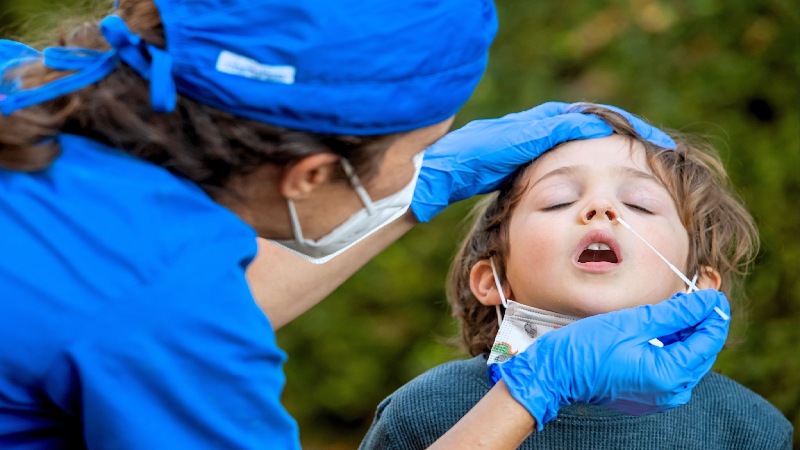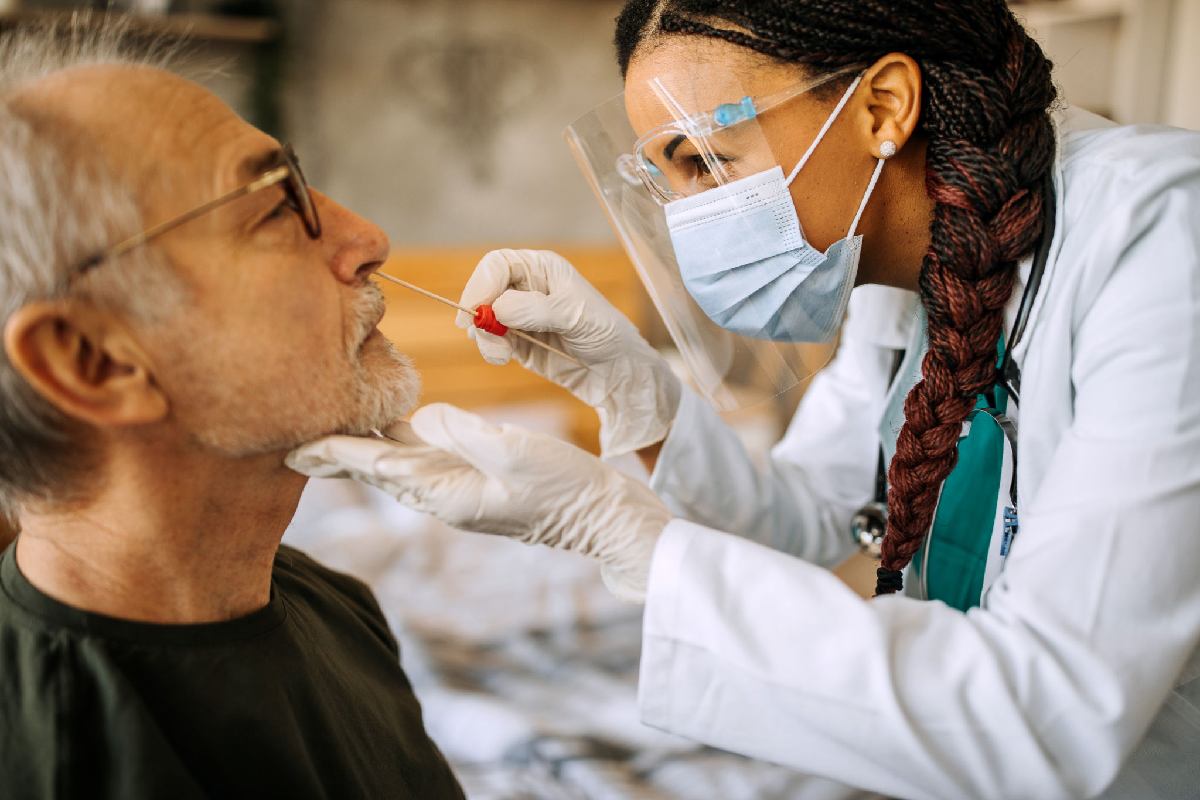A Covid-19 is a group of viruses that cause illnesses ranging from the common cold to more severe illnesses such as pneumonia, Middle East respiratory syndrome (MERS), and severe acute respiratory syndrome (SARS). It must be noted that the strain of coronavirus (2019-nCoV) that has caused the outbreak in China is new and was not previously known.
Types of COVID-19 Screening Tests
At Costumed, we offer you three types of tests to detect if you suffer from COVID-19 disease
The first curve (intense blue): refers to infection by the virus, called the viremia period.
Second curve (soft blue): refers to the rise of IgM antibodies
Third curve (red): refers to IgG antibodies.
The period or stage of the diseases in which each test can detect the Covid-19 virus.
The usefulness of each test must be identified for the individual stage of the disease. Usually, Covid can have an incubation period of up to 14 days and remain infectious for up to another 14 days. The reason why isolation is suggested to the patient is to avoid spreading the disease.
Rapid Blood Test

Immunoglobulin levels are analyzed so that the concentration of the different antibodies is measured. Our immune system, which is responsible for defending us against diseases, makes antibodies to protect us from pathogens such as bacteria, allergens or viruses. These antibodies are different depending on what they are fighting.
There are numerous types of antibodies:
- Immunoglobulin A (IgA). Present in the respiratory zone, digestive system, saliva, tears and breast milk.
- Immunoglobulin G (IgG). It is mainly found in the blood and protects against bacterial infections and viruses.
- Immunoglobulin M (IgM). It is found in the blood and lymphatic fluid, and it is the first antibody formed to fight infections.
- Immunoglobulin E (IgE). It is found in the blood but small amounts; its production is triggered when the body reacts acutely to allergens or when fighting a parasitic infection.
- Immunoglobulin D (IgD). Present in the blood in small amounts.
Rapid blood tests permit us to evaluate the concentrations of these different types of immunoglobulins and know if you are protected against the Sars COV 2 virus by having developed antibodies. Antibody levels begin to rise as the disease progresses.
The rapid tests that we have for you analyze the IgG and IgM levels so that the existence of active immunoglobulin (IgM) is identified in response to the infection that is taking place (COVID-19), that is, an acute infection, or if there is “memory” immunoglobulin (IgG) created against COVID-19, which would suggest that the disease has progressed. There is already a defence response in the immune system.
Our rapid tests have the application authorization issued by the Federal Commission for the Protection against Sanitary Risks (COFEPRIS) on May 18, 2020, in the Official Gazette of the Federation.
Rapid Antigen Test
The Rapid Antigen Test is a test recently approved for use by the WHO as a new type of diagnostic test for COVID-19 disease.
This type of covid test detects protein material of the virus that exists in its protective layer, that is, proteins that are part of the configuration of the virus (also called “antigens”). When detected, it is presumed that the patient contracted the Sars CoV-2 virus and thus may develop the COVID-19 disease and be a person capable of spreading the infection.
The antigen test is being widely used due to its rapid results since, once the sample is taken, it’s processing in the laboratory takes 20 to 30 minutes.
A wholly sealed kit is used to perform the rapid antigen covid test, which contains a long swab with which a sample is taken from the nasopharynx. Once the piece is composed, it is processed to identify the protein chains and determine the presence or not of the Sars CoV virus. -two. The delivered results are qualitative, that is, “Positive” or “Negative.”
Rapid Antigen Tests work best within the first seven days of having suspicious symptoms of COVID-19. After this period, the chances of giving a false Negative result increase.
PCR Test (Polymerase Chain Reaction)
The PCR test is the chief test used to detect the Sars-CoV-2 virus, which causes the COVID-19 disease in humans.
This is a molecular biology laboratory test whose objective is to find the genetic material of pathogenic agents that can cause disease. Taking a miniature model of organic material, it is potentiated and maximized, recognizing if the agent’s genetic chain occurs specifically.
In the case of the Sars-CoV-2 test, a variant of the PCR test known as RT-PCR is performed, for its acronym in English Reverse Transcription Polymerase Chain Reaction, that is, polymerase chain reaction with reverse transcriptase. This test is performed when there is no DNA in the analyzed genetic material but an RNA of the pathogenic agent, so the RNA is analyzed. Using an enzyme called “reverse transcriptase”, it is translated into Complementary DNA. Once this is done, it is maximized to perform the identification.
The sample is taken with a nasopharyngeal exudate, where a long swab is inserted through the two nostrils (nostrils) to the throat. With a rotating movement, a sample of nasal secretion is taken.
The PCR test Vancouver is highly effective. It has a high specificity in differentiating between similar pathogens and high sensitivity in detecting the pathogen even when it is only present in small quantities in the sample and in the early stages of contagion.
Test Values
Our test values for IgG are as follows:
- 100% sensitivity
- Specificity: 99.5%
- Accuracy: 99.6%
Our test values for IgM are as follows:
- Sensitivity 91.8%
- Specificity: 99.2%
- Accuracy: 97.8%
The values of our Antigen test are as follows:
- Test Sensitivity: 93.3% (98.2% for samples with Ct values ≤33)
- Test Specificity: 99.4%
The reliability value of the PCR (Polymerase Chain Reaction) test is 100%.
FAQS
What does the PCR test consist of?
It consists of detecting the genome of the RNA virus, which is specific to the SARS-CoV-2 virus.
What does this test analyse?
This test looks at deoxyribonucleic acid or DNA. Each person has unique characteristics in its DNA (genetic identity); This test extracts the DNA of the virus to identify it as the DNA fraction is identified as Covid-19.
Is it the most effective test?
Yes, it is the Gold Standard. This means it is the most reliable and accepted test to diagnose Covid-19 since it detects it from the first stage when symptoms do not yet appear.
What is the difference with the rapid test?
The PCR indicates if you have the infection and detects the DNA of the virus during the first (-7 days) when symptoms do not yet appear. Approximately one week later (depending on the patient), when the symptoms appear (0 to 7 days), IgM antibodies begin to rise (7 to 10 days) and later IgG antibodies (12 or 15 days), the latter can remain up to 2 months, which are the type of antibodies detected by the rapid IgM/IgG test.
PCR test is positive, but no covid 19 symptoms. What does it mean?
The virus has been contracted and is in our body, but it may be that we are not yet developing symptoms; that is, we are in the incubation period, or if this period has passed, what is an asymptomatic patient? Some people never arrive to present symptoms.
What are the recommendations for performing the PCR test?
It is recommended to fast for 3 to 4 hours, INCLUDING DRINKS, and carry out the epidemiological study format.
My PCR test was positive; what should I do?
Seek medical advice; prompt detection and correct treatment can prevent future disease complications. Isolate yourself and notify contacts of possible transmissions. QUICK TESTS
What does it mean IgM is positive & IgG negative?
IgM is the active infection; it is in the period of the disease where the body is responding with the greatest attack of IgM antibodies against the virus. This means that it is in the contagious phase and should be isolated according to the doctor’s instructions.
What does IgM negative IgG positive mean?
He had the disease but is no longer contagious. He has more excellent immunity not to contract Covid-19.
What does it mean if my PCR test is positive and the IgG test?
It means we have the infection and the viral DNA in our bodies. It is possible to test positive for IgG, but this cannot be determined until a complete antibody test, including IgM (which determines that you have an active infection), is done.
Conclusion:
That is to say, here in the above article; we have discussed the types of covid test, and also we have covered some of the critical Frequently asked questions. We hope that you find the above content helpful.



